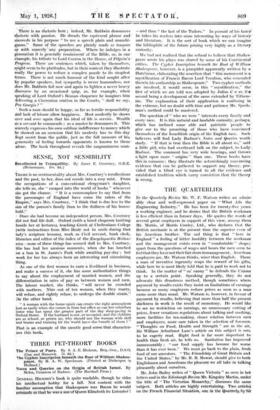SENSE, NOT •SENSIBILITY
Recollected in Tranquillity. By Janet E. Courtney, O.B.E. (Heinemann. 10s. 6d.)
THERE is no sentimentality about Mrs. Courtney's recollections and the past, to her, does not recede into a rosy mist. From the occupations of a conventional clergyman's daughter, she tells us, she " escaped into the world of books " whenever she got the chance. " It is a commonplace to say that from the parsonages of England have come the rulers of the.
Empire," says Mrs. Courtney. " I think that is due less to the size of- the parson's family than to the dullness-or his 'house-
hold."
Once she had become an independent person, Mrs. Courtney did not find life dull. Oxford (with a hired chaperon knitting: beside her at lectures); teaehing: Gi•eckat" Cheltenham College (with instructions from Miss-Beale not to smile during that lady's scripture lessons), work ;as Civil servant, bank clerk,•
librarian and editor of-the index of the -Encyclopaedia Briton-' nica—none of these things has seemed dull to Mrs. Courtney..
She has had her anxious" moments, when she has lunched on a bun in St. James's Park while awaiting pay-day ; but work for her has always beeti an interesting and stimulating thing.
As one of the first women to earn a livelihood in business, and make a success of it, she has some authoritative things. to say about the employment of married women, and the differentiation in rates of pay as between women and men. The labour market, she thinks, " will never be crowded with mothers. Nine out: of ten women, when they marry, will refuse, and rightly refuse, to undergo the double strain." On the other hand,
" A woman with the home spirit can create the right atmosphere just as easily when she cornea in from her office as can her suburban sister who has spent the greater part of the day shop-gazing in Oxford Street. If the husband is out, or occupied, and the Children are at school, or grown up, why. should not the woman with skill and brains and training let the world have the benefit of them ? "
That is an example of the caustic good sense that character- izes this book.














































 Previous page
Previous page